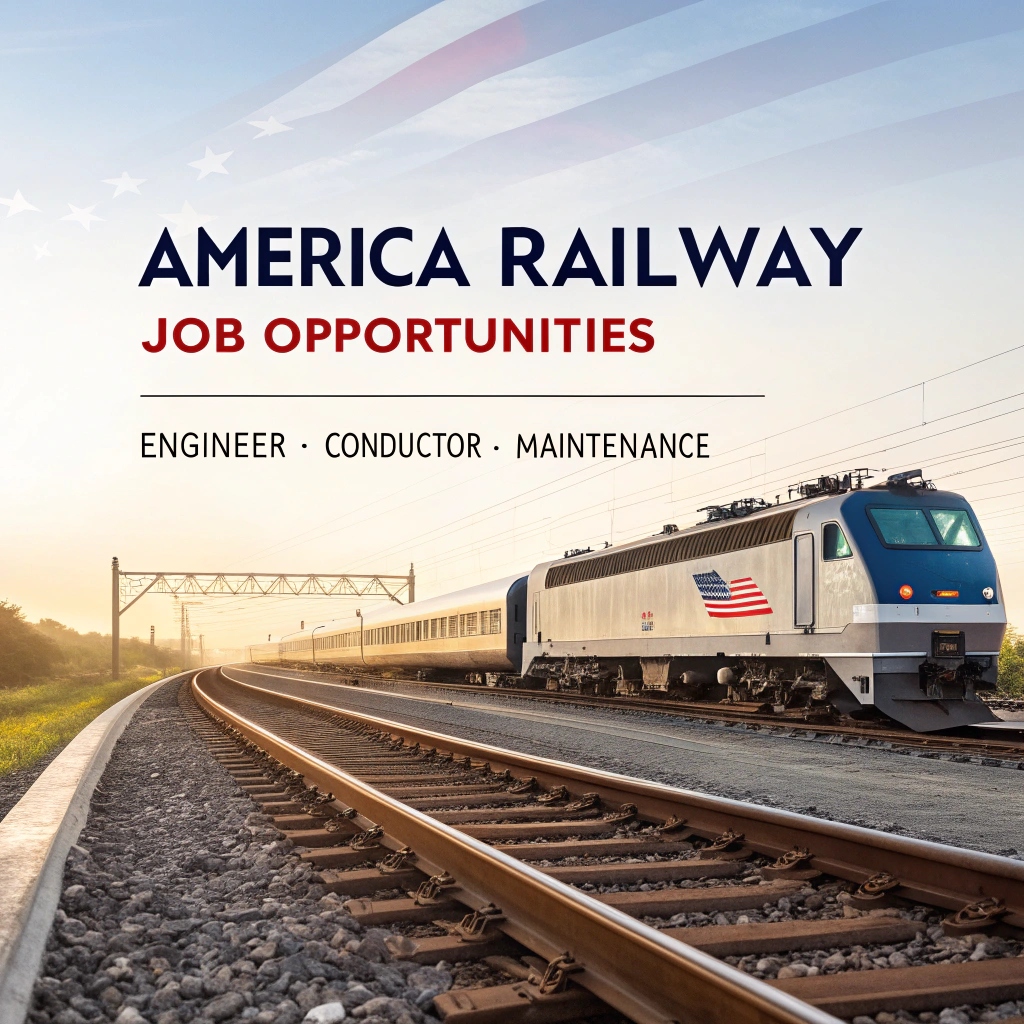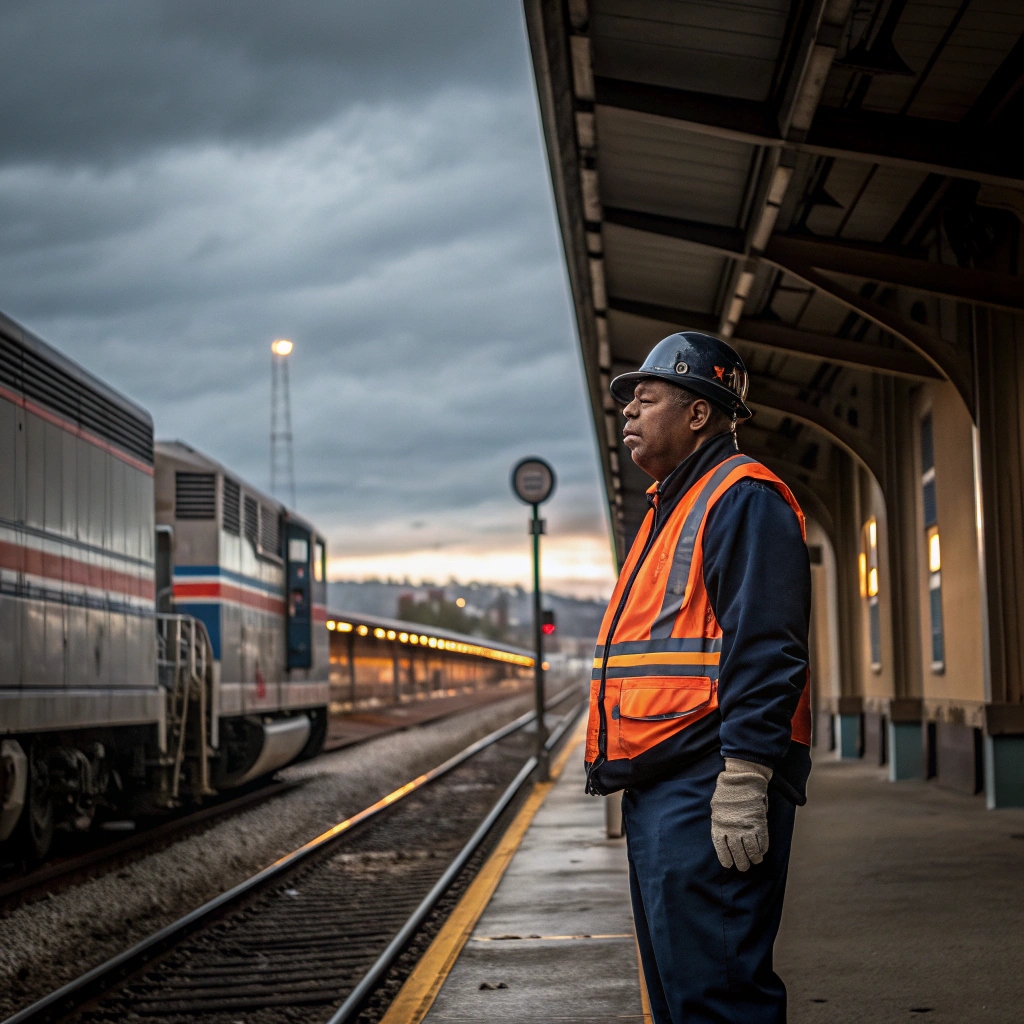America Railway Job
The railway industry in the United States is a cornerstone of the nation’s transportation system, providing essential services for passengers and freight across the country. With the continued growth of infrastructure and modernization of rail networks, the demand for skilled and dedicated professionals in railway jobs is steadily increasing.
This comprehensive guide will cover everything you need to know about America railway jobs—including available roles, eligibility requirements, application procedures, salaries, career growth opportunities, and tips to land your dream job in the U.S. railway sector.
Whether you are a fresh graduate, an experienced professional, or someone seeking a career change, this guide is designed to help you navigate the railway job market in America effectively.

America Railway Job
Overview of the U.S. Railway Industry
Importance of the Railway Sector
- Efficient transportation of goods and passengers
- Reduces road traffic and environmental impact
- America Railway Job
- Supports economic growth and regional connectivity
Key Players in the U.S. Railway Industry
- Amtrak – Passenger rail services across major cities
- Union Pacific Railroad – Freight transportation across the western U.S.
- CSX Transportation – Freight rail services in the eastern U.S.
- BNSF Railway – One of the largest freight rail networks in the country
- Norfolk Southern Railway – Freight services in the eastern U.S.
Types of Railway Jobs in the USA
Passenger Services
- Train Conductors – Ensure passenger safety, handle tickets, and provide customer service
- Ticketing Agents – Assist passengers with bookings and inquiries
- Station Attendants – Manage station operations and assist travelers
Freight Services
- Locomotive Engineers – Operate trains and ensure safe transit
- Rail Yard Operators – Coordinate freight handling and train assembly
- Freight Handlers – Load, unload, and organize cargo
Technical and Engineering Roles
- Railway Engineers – Design and maintain tracks, bridges, and stations
- Signaling Technicians – Install and maintain signaling and communication systems
- Mechanical Technicians – Maintain locomotives and rail cars
Administrative and Support Roles
- Safety Inspectors – Monitor compliance with safety regulations
- Operations Managers – Oversee train schedules and logistics
- Customer Service Representatives – Handle passenger inquiries and complaints
Eligibility and Requirements
Educational Qualifications
- High School Diploma – Entry-level positions such as freight handlers or station attendants
- Associate/Bachelor’s Degree – Engineering, logistics, or transportation management for technical roles
- Certifications – Railway safety, signaling, and operations certifications enhance career prospects
Age and Physical Requirements
- Minimum age requirement typically 18 years or older
- America Railway Job
- Good physical health for roles involving manual labor or train operation
- Ability to work in shifts, including nights and weekends
Skills Required
- Strong communication and teamwork abilities
- Problem-solving and critical thinking skills
- America Railway Job
- Technical proficiency for engineering and signaling roles
- Customer service skills for passenger-facing positions
How to Find Railway Jobs in America
Online Job Portals
- Indeed USA – Filter for “railway jobs” by location
- LinkedIn – Network with railway professionals and apply directly
- Glassdoor – Check company reviews and salary information
- USAJobs – For government railway or transportation roles
- Government railway-America Railway Job
Railway Company Career Pages
- Amtrak Careers – https://www.amtrak.com/careers
- Union Pacific Careers – https://www.up.com/careers
- CSX Transportation Careers – https://www.csx.com/index.cfm/careers
Recruitment Agencies and Training Programs
- Some agencies specialize in placing candidates in railway operations
- On-the-job training programs are often available for entry-level candidates
Step-by-Step Guide to Apply
Step 1 – Prepare Your Resume
- Highlight relevant education, certifications, and technical skills
- Include work experience, internships, or volunteer roles if applicable
- Tailor your resume to match the specific railway job description
Step 2 – Write a Cover Letter
- Express your interest in the railway sector
- America Railway Job
- Highlight any experience or skills that align with the role
- Show enthusiasm for contributing to safe and efficient railway operations
Step 3 – Apply Online
- Submit applications through company career portals or job boards
- Track applications using a spreadsheet for follow-ups
Step 4 – Prepare for Interviews
- Research the company’s operations and safety standards
- Be prepared for technical questions (for engineering/technical roles)
- Demonstrate teamwork, problem-solving, and customer service abilities
Step 5 – Follow Up
- Send a thank-you email after interviews
- America Railway Job
- Stay professional and patient throughout the hiring process
Salary and Benefits

Entry-Level Salaries
- Freight Handler / Station Attendant: $30,000–$40,000 per year
- Customer Service Representatives: $32,000–$45,000 per year
Mid-Level Salaries
- Locomotive Engineer: $60,000–$80,000 per year
- Mechanical Technician: $50,000–$70,000 per year
Senior-Level Salaries
- Operations Manager: $80,000–$120,000 per year
- Railway Engineer: $70,000–$100,000 per year
Additional Benefits
- Health, dental, and vision insurance
- Paid leave and retirement plans
- Training and career development programs
Pros and Cons
Advantages
- Stable and growing industry with long-term career prospects
- Opportunities for technical and managerial growth
- Diverse roles suitable for various skill levels
- Travel and work across different states
Challenges
- Irregular shifts including nights and weekends
- Physically demanding roles for some positions
- High safety and regulatory compliance standards
Future of Railway Jobs in the USA
Industry Trends
- Digitalization and automation in railway operations
- Smart signaling and real-time tracking systems
- Expansion of freight and passenger networks
- Green initiatives and sustainable rail projects
Career Growth Opportunities
- Technical specialists → Supervisors → Operations Managers
- Safety officers → Senior safety consultants
- Customer service roles → Station managers → Regional managers
Internal & External Links
- Internal Link Ideas:
- External Links:
Frequently Asked Questions (FAQ)
What types of jobs are available in the U.S. railway industry?
Do I need a degree to work in a railway job?
Entry-level positions may only require a high school diploma, while technical and managerial roles often require a degree.
Can I work in railway jobs without experience?
Yes, entry-level roles like freight handlers or station attendants often provide on-the-job training.
What skills are essential for railway jobs?
Safety awareness, teamwork, communication, technical knowledge, and problem-solving are crucial skills.